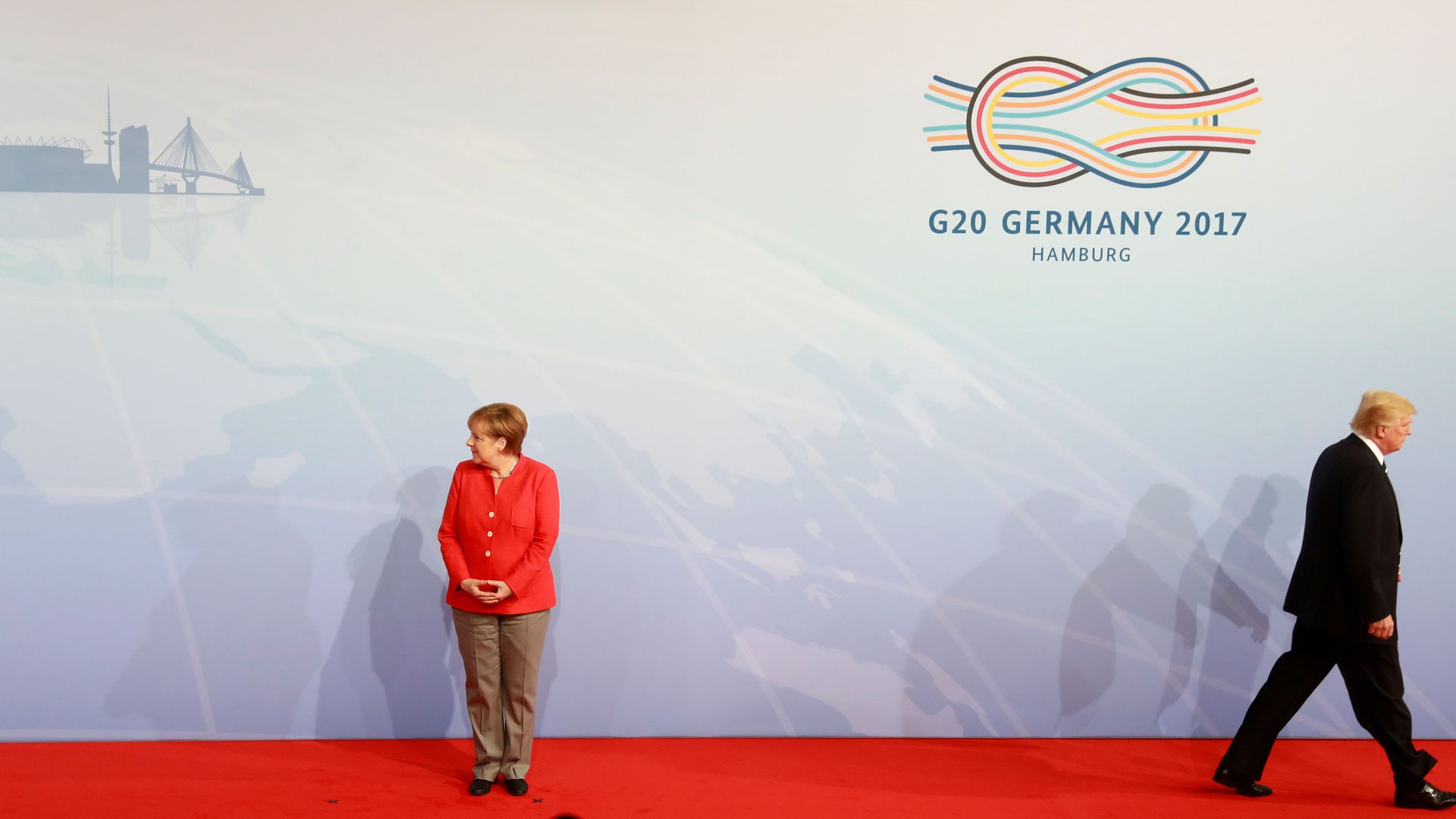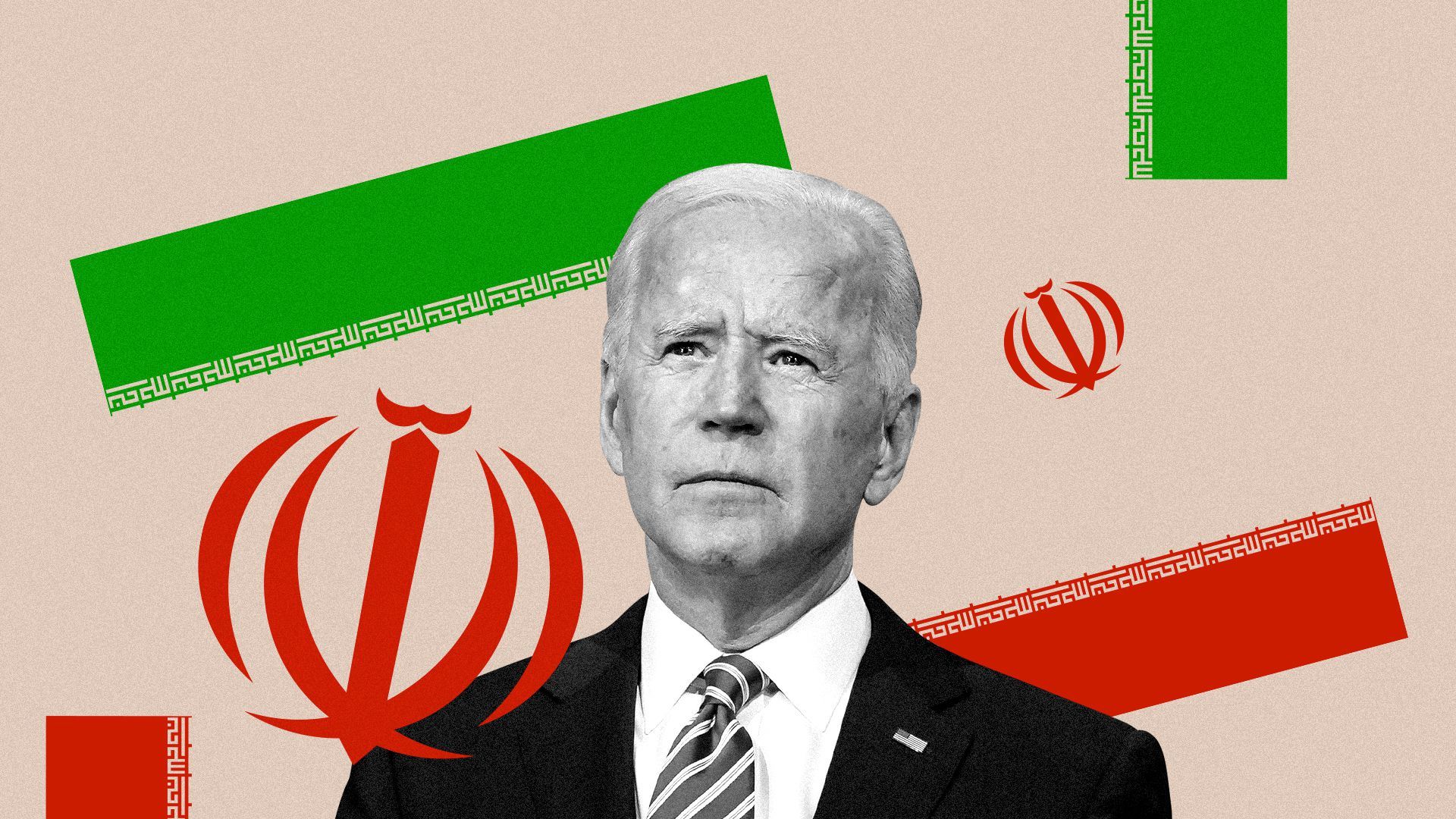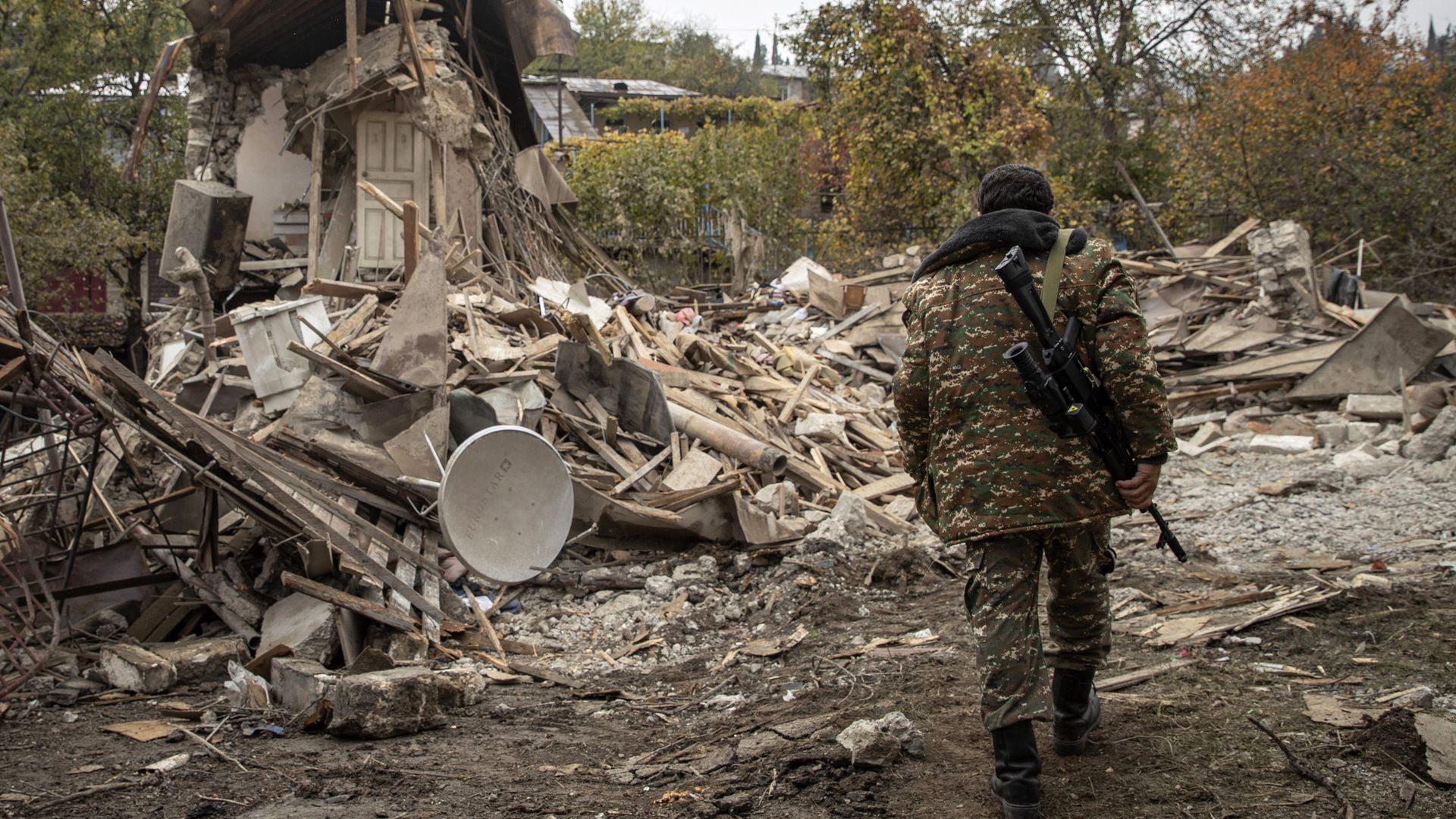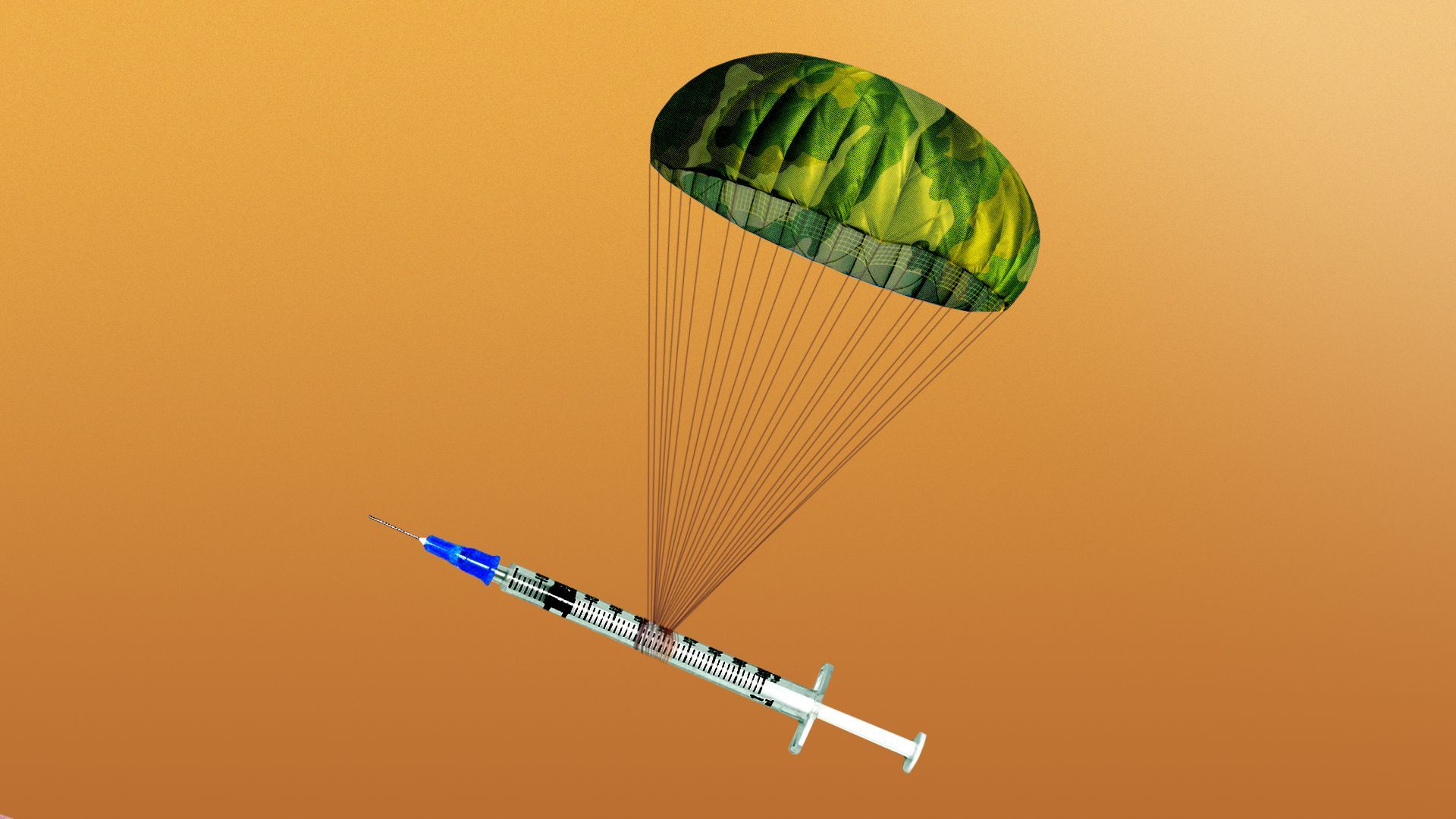| | | | | | | Presented By Raytheon Technologies | | | | Axios World | | By Dave Lawler ·Nov 09, 2020 | | Welcome back to Axios World. I hope you had a lovely weekend. - We're diving in tonight with the global reaction to Biden's victory before turning to some shocking breaking news from Nagorno-Karabakh (1,681 words, 6 minutes).
- Reply to this newsletter with your tips and suggestions, and tell your friends to sign up.
| | | | | | 1 big thing: The world is moving on from Trump |  | | | "Next." Photo: Odd Andersen/AFP via Getty Images | | | | Governments around the world are preparing to work with President-elect Biden — but they still have to navigate what could be a bumpy final 10 weeks of President Trump. Split screen: Around the time Biden was holding his first call as president-elect with a foreign leader, Canadian Prime Minister Justin Trudeau, Trump was firing his secretary of defense, Mark Esper. - Not only is Trump clearing out his national security team — the directors of the FBI and the CIA are likely to be next — his administration has refused to initiate the transition process that's intended to ensure a smooth handover to Biden's team.
- Trump loyalists are warning staff not to prepare for a transition, Axios' Jonathan Swan reports, based on leaked audio of a conference call today with U.S. Agency for International Development staff.
- Adm. James Stavridis, the former Supreme Allied Commander for NATO, accused Trump today of "playing with fire with our nation's security" with his "burn it down on the way out" approach.
State of play: Most world leaders ignored Trump's protestations and congratulated Biden shortly after his victory was declared on Saturday. - They included leaders who have built a warm relationship with Trump, like Indian Prime Minister Narendra Modi, U.K. Prime Minister Boris Johnson and — after a delay — Israeli Prime Minister Benjamin Netanyahu.
- On Sunday, even Hungarian Prime Minister Viktor Orbán joined them.
The flipside: Some leaders are still waiting to recognize Biden's victory, perhaps in part because they don't want to provoke Trump. - Chinese President Xi Jinping "has incentive to try to avoid being in Trump's political crosshairs" — and to avoid any impression of political interference in the U.S., the Brookings Institution's Ryan Hass notes.
- Mexican President Andrés Manuel López Obrador's refusal to recognize Biden fits into his pattern of carefully avoiding Trump's ire, the LA Times notes. (He also has his own history of challenging election results.)
Russian President Vladimir Putin has declined to congratulate Biden as well, citing Trump's legal challenge. Russian media have seized on Trump's claims to paint a general picture of democratic chaos, per the NYT. - Two other nationalists with close ties to Trump — Turkish President Recep Tayyip Erdoğan and Brazilian President Jair Bolsonaro — have also been silent.
For most of the world, though, the focus will now be on building close ties with the incoming Biden administration. - They'll be aiming to secure early phone calls with Biden and win his support for their priorities.
- Trudeau, for example, raised the detentions of two Canadians in China on his call with Biden, and later said he expects Biden's backing on that issue.
- Johnson is attempting to shake off his association with Trump by finding common cause with Biden on climate change.
The bottom line: Before the world can truly turn the page on Trump, it will have to see what the next 10 weeks bring. |     | | | | | | 2. Trump tries to box Biden in on Iran |  | | | Photo illustration: Aïda Amer/Axios. Photo: Drew Angerer/Getty Images | | | | The Trump administration, in coordination with Israel and several Gulf states, is planning a string of new sanctions on Iran, Axios' Barak Ravid scooped. Why it matters: The "flood" of sanctions is intended to make it harder for the Biden administration to revive the 2015 nuclear deal. Behind the scenes: In the last several weeks, the Trump administration — with the encouragement and assistance of the Israeli security establishment — has prepared a "target bank" of Iranian entities to sanction. - Iran envoy Elliott Abrams said in a closed briefing several days ago that the Trump administration wants to announce a new set of sanctions on Iran every week until Jan. 20, a source who was privy to the briefing told Barak.
Between the lines: Biden's plan to return to the nuclear deal if Iran resumes compliance hinges on the withdrawal of sanctions tied to Iran's nuclear program. - But the new sanctions will be linked instead to Iran's ballistic missile program, assistance to terror organizations and human rights violations.
- The Trump administration believes that it will be a difficult sell politically for Biden to lift such sanctions and that he won't be able to make a deal without doing so.
- Biden's team has seen this move coming and seems to disagree, though they acknowledge that preserving and extending the deal will be no simple task.
Driving the news: Abrams arrived in Israel on Sunday and met with Netanyahu and National Security Adviser Meir Ben-Shabbat to discuss the sanctions plan. - He'll travel next to Abu Dhabi and Riyadh to discuss the plan.
- Both the UAE and Saudi Arabia are wary about Biden's less hawkish approach to Iran, Barak notes.
Go deeper: How Biden might tackle the Iran deal |     | | | | | | 3. What to do about Saudi Arabia |  | | | Biden arrives in Riyadh in 2011. Photo: AFP via Getty | | | | Biden has set out a clear starting point when it comes to Iran, but it's less clear how he will engage with the Saudis. Why it matters: The Trump administration shielded Saudi Arabia from the bipartisan anger that swelled in Washington after the murder of Jamal Khashoggi, as well as over civilian casualties in Yemen. Now that buffer is disappearing. Driving the news: After 24 hours of silence, King Salman and Crown Prince Mohammed bin Salman (MBS) congratulated Biden on Sunday, emphasizing the "historic" relations between the U.S. and Saudi Arabia. Flashback: Saudi Arabia was a frequent target for criticism during the Democratic primary, and Biden himself vowed to cut arms sales and "make them... the pariah that they are." - He has also said he'll put human rights and democracy at the heart of U.S. foreign policy, and end U.S. support for the war in Yemen.
- Yes, but: Biden may be more willing to criticize the Saudis, but he's not willing to sever the partnership altogether.
"In many ways I think Saudi Arabia and the broader approach to the Gulf is going to be the real test of what a new American approach to the Middle East would look like," says Suzanne Maloney, an Iran expert at the Brookings Institution. - "How we approach Saudi Arabia — a partner for more than a century which has been vital in a number of key issues, whose role in oil markets is central to global economic stability — is going to be really important."
- It will be a key test of Biden's willingness to "really apply tough talk to allies and partners where there are divergences, without disrupting diplomacy on shared interests," Maloney says.
What to watch: "Whether MBS is really prepared to take on a fight with the United States, I think is fundamentally unclear," she adds. |     | | | | | | A message from Raytheon Technologies | | The future of aerospace and defense is here | | |  | | | | At Raytheon Technologies, nearly 200,000 engineers, scientists and researchers are pushing the limits of known science to explore deep space, advance aviation and build smarter defense systems that protect all of us here at home. That's the future of aerospace and defense. Learn more at RTX.com | | | | | | 4. Breaking news: Armenia announces "painful" deal to end war |  | | | The aftermath of shelling in Stepanakert, the capital of Nagorno-Karabakh. Photo: Stanislav Krasilnikov/TASS via Getty | | | | Armenian Prime Minister Nikol Pashinyan surprised his country and the world tonight by announcing that he had agreed to end the war in Nagorno-Karabakh on terms that were "unbelievably painful for me personally and for our people." Why it matters: The announcement followed confirmation that Azerbaijan had taken a critical town in the breakaway region, which is majority ethnic Armenian but lies within neighboring Azerbaijan. - Pashinyan said he had agreed to the terms of the deal along with the leaders of Russia and Azerbaijan.
- In a deeply emotional Facebook post, he conceded that this was "not a victory," but the best outcome Armenia could hope for under the circumstances. The precise terms of the deal are unclear.
The big picture: Azerbaijan has made significant gains in and around Nagorno-Karabakh during the six-week-long war and vowed to change the status quo through military force after three decades of failed diplomacy. - With the help of its ally Turkey, it seems to have now done so.
Driving the news: The announcement has sparked chaotic protests in Armenia's capital, Yerevan. Protesters have reportedly stormed government buildings. - "One protester yells at me 'Nikol has sold us out. He has betrayed this country,'" reports journalist Neil Hauer, who is on the scene.
|     | | | | | | 5. State of the outbreak: The good news |  | | | Illustration: Annelise Capossela/Axios | | | | U.S. pharmaceutical giant Pfizer announced today that a vaccine developed with German biotech company BioNTech reduced cases of symptomatic COVID-19 by over 90% in clinical trials — a result that Dr. Anthony Fauci called "just extraordinary." - What to watch: Fauci said more good news could come soon from other vaccine trials, including Moderna's.
Pfizer CEO Albert Bourla told Axios' Dan Primack today on our Axios Re:Cap podcast that data on the safety of the vaccine will be published next week. Soon after that, Bourla said, Pfizer will seek approval from the U.S. Food and Drug Administration. - What he's saying: "It was a great relief. I had goosebumps and tears in my eyes," Bourla said about learning of the efficacy data.
- "I was nervous because... if we're not successful, the world is losing hope. And I could feel this weight on my shoulders."
State of play: Pfizer says it will have 50 million doses available for distribution globally by the end of this year, and 1.3 billion doses by the end of next year. Each patient will require two doses. - Pfizer already has deals to provide doses to the U.S., U.K., EU, Japan, Australia and New Zealand, Bourla said.
- But while Americans will likely have access to one or more vaccines by the spring, many countries will likely be waiting far longer.
The bottom line: The global distribution of a vaccine will be one of the first and most important foreign policy challenges the Biden administration will face. |     | | | | | | 6. State of the outbreak: The bad news | |  Data: Our World in Data; Chart: Naema Ahmed/Axios "We have talked for a long time, or I have, about the distant bugle of the scientific cavalry coming over the brow of the hill. And tonight that toot of the bugle is louder. But it is still some way off." Between the lines: That's how U.K. Prime Minister Boris Johnson described the Pfizer news. He was emphasizing that vigilance is still required in the present, even if the future is starting to look a bit brighter. - "We absolutely cannot rely on this as a solution," he said, with a note of uncharacteristic caution.
Where things stand: As has been feared throughout Europe's staggering spike in cases, hospitalizations across the continent have now surpassed their levels during the spring peak, per European Centre for Disease Prevention and Control data. - "Even if new control measures are effective in tamping down the spread of the virus, it may take weeks before they ease the burden on hospitals," the NYT notes.
- "There is hope that no place will experience the level of death that Bergamo, Italy; New York City and Madrid suffered this spring. How the virus spreads is better understood now, and treatments have improved, giving sick people a better chance of survival."
- But it's clear now that we're about to see a spike in deaths in Europe and likely soon thereafter in the U.S., which is on a similar trajectory.
|     | | | | | | 7. Stories we're watching |  | | | Sniffing for truffles in Alba, Italy. Photo: Marco Bertorello/AFP via Getty | | | - Pete Buttigieg likely for UN ambassador
- Biden's climate diplomacy will face hurdles
- How newspapers around the world reported Biden's win
- Biden and America's place in the world
- Ukrainian President Zelensky has coronavirus
- Turkish finance minister resigns
- U.K. to back child poverty fund following appeal from soccer star
"Yes, yes, yes." — Sir John Irving Bell, an immunologist at the University of Oxford, when asked by the BBC whether the latest vaccine news means life will be returning to normal by spring. |     | | | | | | A message from Raytheon Technologies | | The future of aerospace and defense is here | | |  | | | | At Raytheon Technologies, nearly 200,000 engineers, scientists and researchers are pushing the limits of known science to explore deep space, advance aviation and build smarter defense systems that protect all of us here at home. That's the future of aerospace and defense. Learn more at RTX.com | | | | | | Axios thanks our partners for supporting our newsletters.
Sponsorship has no influence on editorial content. Axios, 3100 Clarendon Blvd, Suite 1300, Arlington VA 22201 | | | You received this email because you signed up for newsletters from Axios.
Change your preferences or unsubscribe here. | | | Was this email forwarded to you?
Sign up now to get Axios in your inbox. | | | | Follow Axios on social media:    | | | | | |










No comments:
Post a Comment